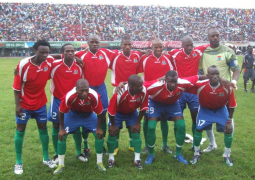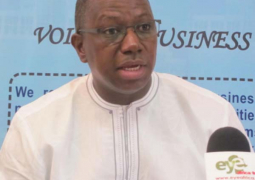Over two hundred and fifty farmers were recently trained on organic manure production by the department of agriculture.
Participants were drawn from Kiang West in the Lower River Region, Nianija in the Central River Region North and Niamina East in the Central River Region South.
The training, implemented by the department of agriculture, was funded by PROGEBE- Gambia National Coordination Unit.
In giving an overview of the training, Emmanuel W. Mendy, project focal officer at the department of agriculture, told farmers that the department, which includes veterinary services, is the technical arm of government, which has the recognition and expertise in the management of natural resources, especially pertaining to crop, livestock and soils.
Mr Mendy made this statement at the end of a nine-day training for farmers on manure production conducted by the Department of Agriculture. Based on this, he explained, the Department of Agriculture, signed a memorandum of agreement between them and the Gambia National Coordination Unit PROGEBE-Gambia of the Regional Project for the Sustainable Management of Endemic Ruminant Livestock of West Africa, since there is need for institutional collaboration in the implementation of the project specific component pertaining to genetic conservation of the indigenous livestock breeds and the management of their habitat and resources.
“This farmer training on organic manure production is one of the activities funded by PROGEBE Gambia National Coordinating Unit (NCU) and implemented by the Department of Agriculture,” Mr Mendy said.
The overview of PROGEBE, according to Mr Mendy, is designed to enhance conservation of biodiversity of endemic ruminant livestock, their unique genetic traits and habitats and improve their productivity with a view to strengthening food security and poverty alleviation.
Mr Mendy noted further that the overall objective of the training “is to develop and implement approaches to community-based conservation and management of the environment through the use of “organic manure”, produce nutritive crop residues and good biomass for the feeding of the endemic ruminant livestock; therefore, it contains different steps and techniques on manure production.
He added that the importance attached to the farmer training on organic manure production cannot be over-emphasised since crops produced with the use of organic manure have more value even at the international market. The method also does bring about reduction on the burden for the search of the expensive and not readily available chemical fertilizer, which requires some technical knowhow for the application, to name a few.
Mr Mendy also buttressed the importance of organic manure, which increases more crop yield, maintains the soil structure and retains the soil nutrients for longer period since it releases soil nutrient on a gradual basis unlike chemical fertilizer.
He added that there is less cost involved in organic manure production. “The materials you need to make compost or organic manure is within our environment; more so the process of preparing compost manure is one way of contributing to the cleanliness of the environment and that adds to our good health,” he said.
“This training is an opportunity for the farmers to make the best use of the knowledge gained so that after the training they should be able to make compost manure, which is cheap, easy to manage and produce better yield rather than going for the chemical fertilizer, which is expensive and sometimes not available when the need arises.”
He therefore used the training opportunity to call on participants to take it up seriously such that “when you go back you will be able to teach members of your communities. “Since everybody cannot be on board, a few of you are selected to represent your communities,” he said.
He then assured the participants that the Department of Agriculture through the Regional Agricultural Directors, his humble self and the entire staff on the ground will continue to support farmers in every way possible throughout the face of the project and beyond to make The Gambia the food basket of Africa.




